Saying goodbye and departing a friend's home may be a simple act in America, but in Ireland there is an unwritten code of honor that guides farewell rituals.
There are superstitions that must be adhered to, or God forbid you may draw some form of ill fate upon your unsuspecting self.
In Ireland these rituals take time, so I was extremely surprised to learn that in the northeast of the United States, especially around New York, an Irish goodbye is associated with a quick departure.
Today, let's explore the Irish superstitions and traditions around the simple, everyday event of saying goodbye, and try to establish reasons for the development of a quick Irish American goodbye.
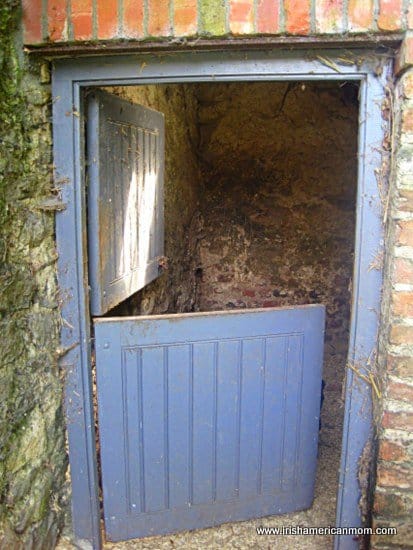
Table of Contents
- Family Superstitions Around Leaving A Home
- Old Irish Greetings and Farewells
- A Holy Water Font At The Door
- A Formal Farewell Ritual - An Irish Custom
- Superstitious Rituals For Luck On Leaving An Irish Home
- Leaving A House While Churning Butter
- Leaving An Irish Home In The Month Of May
- Even More Departure Superstitions From Ireland
- A Child Leaving A Home
- Saying Goodbye When Leaving A Church
- Saying Goodbye To Your Old Home At The Time Of A Marriage
- Goodbye Rituals At Irish Wakes
- The Irish Goodbye - An Irish American Phenomenon
- Conclusion
Family Superstitions Around Leaving A Home
I always remember my mother's superstitions about a first visit to a new friend's home.
She advised me to always leave by the door through which I first entered so that bad luck would not follow me.
I have arrived at parties in the U.S. where all the guests are streaming through an open garage door. Try as I might to forget obsolete traditions of my youth, my unwilling feet always lead me to the front door of each and every home I visit.
I find it very difficult to arrive nonchalantly through a back door with an enthusiastic announcement of my arrival. For me, the ding dong of a door bell wards off those bad luck spirits ruling over ancient Irish greeting rituals.
And then of course there's the issue of the door through which I must leave, to avoid bringing ill luck my way.
Yes, I confess. I am part of the superstitious Irish race.

My mother's words return, and you know you should never ignore your mother.
"For good luck leave by the door through which you entered on your first visit to a home."
If I go in through an open garage when I arrive in daylight, it can be a little awkward to ask to exit through the garage, if it's all closed up at the end of a night's festivities.
Oh the dilemmas of carrying old cultural ways all the way to a new land.
Old Irish Greetings and Farewells
In olden days in Ireland it was thought to be very important to greet people and depart from them with a blessing.
When arriving at a house, Irish people would say:
"God bless all here."
The people of the house would reply with another blessing:
"God save you kindly."
On leaving the house the visitor would say:
"God be with you."
In some parts of the country, this farewell blessing was worded this way:
"God remain forever in this abode."
Now if you were saying goodbye to a friend who had a long journey ahead, you would send them on their merry way by saying:
"May God direct you."
Another version of this goodbye was the saying:
"God speed you!"
Another favorite saying for wishing someone well when leaving was:
"That God may break your Crosses."
If a good friend was departing, and there was a chance you would not see one another again for a long time, then the departure blessing grew more poetic:
"I wish you health,
I wish you wealth,
I wish you golden stores,
I wish you heaven after earth,
And who could wish you more."
When a person would come to a house on Christmas Eve, he or she would utter a different greeting like this:
"I wish you a happy Christmas and a bright New Year."
When leaving the house he or she would say:
"I hope we will be all alive this time twelve months."
In Ireland today we use the word "slán" (pronounced slawn) when saying goodbye. It literally means safe. When driving around the Irish countryside you often see road signs that say "slán abhaile" (pronounced slawn ah-wal-ya), which means safe home.
These signs are often prominently placed on the side of the road as you leave a town or village. Communities all over Ireland continue the tradition of blessing those departing, even through the use of road signs.

A Holy Water Font At The Door
My Irish parents always kept a small font of holy water by the front door, and still do to this very day. Our holy water font is guarded by an angel. Some bear a cross or a Celtic symbol.
When anyone is leaving, especially on a long journey, my mother makes the Sign of the Cross with holy water, blessing those departing as they leave.
Keeping a holy water font by the door is an old Irish family tradition.
On St.Patrick's Day a piece of shamrock is worn when leaving the house, in honor of St. Patrick. Long ago, Irish people would blacken the top of a hazel rod in the fire and then use it to make the sign of the cross on their left shoulder before leaving their house. This was a way of asking St. Patrick to protect them during the coming year.
A Formal Farewell Ritual - An Irish Custom
These greetings and farewells reveal that leaving a person's home was deemed to be part of a ritual focusing around an exchange of blessings. This is probably the reason why to this very day, I continue the drama of bidding farewell to guests leaving my American home.
Unsuspecting visitors to one of our house parties, might announce they are about to leave, and try to slip out the back door, or through the yard unnoticed.
Not in my Irish Home!
Guests must be escorted to the front door for a proper goodbye and thank you. Even my kids know they should join the farewell party as we move out to the porch.
Little do my surprised guests know, but we are exchanging blessings and luck through our goodbye rituals.
Into the bargain, we stand there and wave goodbye as your car departs down the street. Our front door does not close until you have officially departed. I know my neighbors think I'm crazy, but what can I say. I'm Irish.
In Ireland, farewells can go on and on. Deep conversations are launched at the door. A quick exit is very difficult, so plan your departure with plenty of time to spare.
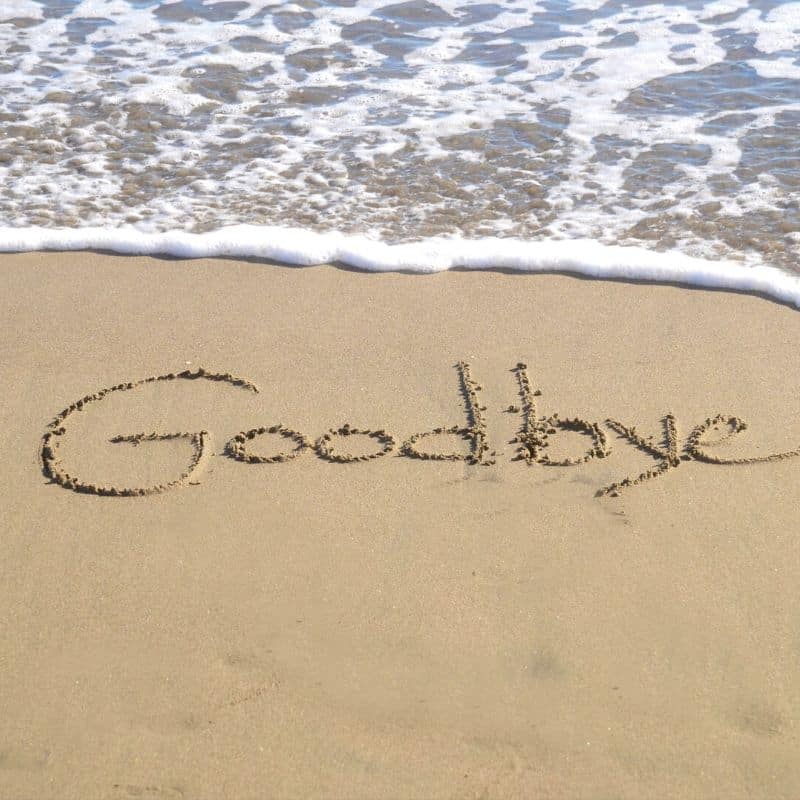
Superstitious Rituals For Luck On Leaving An Irish Home
Once a visitor left an Irish home, a good luck ritual ensued. The people of the house would flip the tongs for the fire, and lay it in alternative position, to bring good luck to the one who just departed the house.
Now if the hosts looked closely around the house they would probably find some little item belonging to the visitor, left slyly in a corner.
It was thought to be lucky for both guest and host if the visitor was to leave some little token after him or her when leaving the house.
This could be a ribbon, a penny, a pebble, a piece of string - any little piece of you would fit the bill, but it could never be something important that you needed to return to retrieve.
There were even more superstitions around returning to a home if you forgot something. If a person left anything behind it was advised that he or she should not go back. Now for anyone who forgot about this superstition or simply could not leave the item for another day, there was an antidote for any bad luck that might be coming your way.
If a person did return, he or she simply had to sit down in the house and count to thirteen. This would keep all that pent up bad luck at bay and the person could go on their merry way with the forgotten item back in their safe keeping.
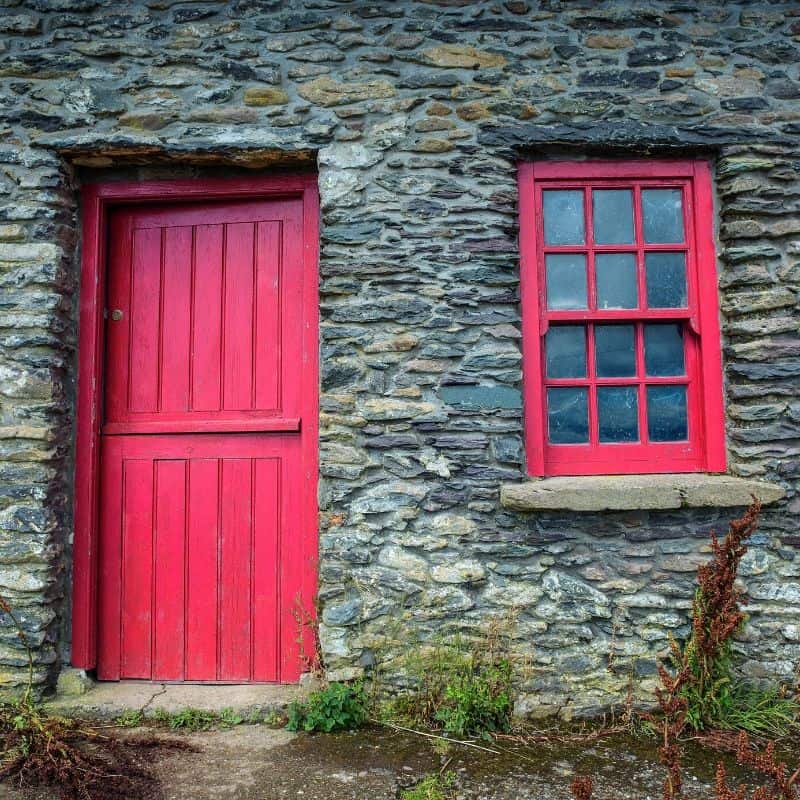
When leaving a house after midnight, a "sméaróid" (pronounced smare-ode) or ember from the fire would be put into a coat pocket to keep the fairies away as you journeyed home.
When you borrowed the live coal from the house to keep you safe from the fairies, you should leave a sod of turf in return. Guests in Ireland would bring two sods of turf to a house if visiting at night. One was left in the house and the other was brought back home again, while a live ember burned a hole in your pocket. Dangerous times, for sure!
Don't worry during my time living in America, I haven't sent any friends on their merry way by hiding a burning coal or two in their pockets.
Leaving A House While Churning Butter
Churning butter was an important task in Irish rural cottages in olden times. There were superstitions about what to do if you visited a home and the occupants were busy making butter.
For fear of the scorn of your friends and family you would never leave without giving a helping hand to churn the butter. In some homes you would not be given permission to leave until the butter making was done. In some parts of the country you were fine to leave, once you had given a few plunges to the churn-dash.
That way you did not risk taking away the butter and luck with you as you left.
While Irish people were churning, they would not let anyone take a coal out of the fire, until after the churning was done.
Some people would not give a drink to anyone until they would first take the butter out of the churn.
It was also thought to be unlucky if water was spilled while churning. And so churning day was a bad day for a visit - nothing to drink and a spell of hard labor before you were allowed to leave.
Leaving An Irish Home In The Month Of May
May Day or Bealtaine was a special day of the year, when you had to be more aware of the luck associated with your home. If a man left your house with a lighted pipe, it was said that all the luck of the house would depart with him, and you would have no luck for a full year to come.
Nobody was allowed to leave a home without a supervisory escort, especially on May Day, and even more especially if a pipe smoking man tried to leave.
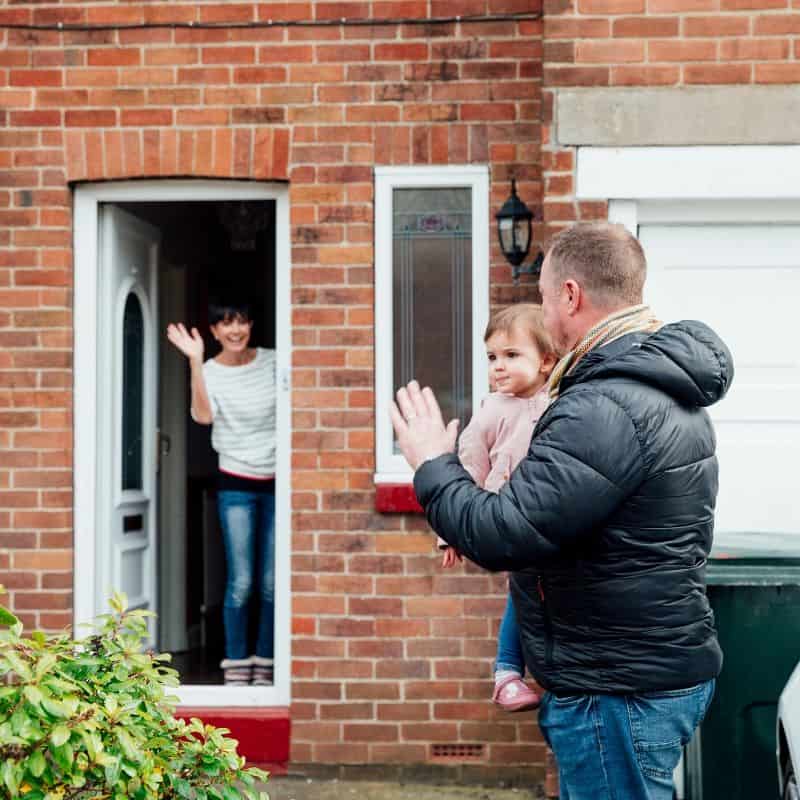
Even More Departure Superstitions From Ireland
If a pair of scissors fell and the point of the scissors was to stick into the ground, it was thought that some one would soon be leaving the house. This meant death or immigration would strike the home.
If a rooster or cockrel stood on the door-step and crowed out toward the surrounding land, some one would soon be leaving the house. However, if the rooster crowed into the interior of the house, it was believed that someone new would soon be coming to live there. This could be a new arrival through marriage or birth, or the owners could change.
If you went to a house for milk, you had to be very careful. Since milk was associated with prosperity and luck, the people of the house put a pinch of salt in the milk before they give it away. Again the salt protected the milk from the fairies.
As you were leaving an Irish person's home you needed to handle your gloves carefully. It was thought that if your gloves fell as you were leaving a house, you were certain to soon meet with disappointment.
Are you growing afraid to ever visit another home at this superstitious rate? But wait, there are even more crazy departure superstitions and rituals in old Irish culture and rural ways.
A Child Leaving A Home
If night had fallen and a child was in a departing party, then more goodbye rituals ensued. When bringing a child out at night, Irish people in days gone by, would put a grain of salt on the child's dress or clothes so that the fairies would not try to steal the child.
Can you imagine how my American friends would run, if I tried to throw salt over their children as they left my home in the dark? I left that superstition behind me in Ireland.
In the month of May it was considered unlucky to bring a new born baby out of the house without shaking a pinch of salt on his clothes to stop the fairies stealing him away. This applied both during the day and night for the whole month of May.
When people were leaving a house for a short time and a child was lying in a cradle, they would put the tongs across the cradle to prevent the fairies from taking the child. The fire tongs was a great tool for guarding good luck and warding off evil spirits, ghosts and the dreaded fairies.
And said tongs needed to be left on the right side of the fire to retain it's magical power at night.
Saying Goodbye When Leaving A Church
As you can see from all of the rituals described above, leaving a house was no easy task in Ireland in centuries past. So it will come as no surprise that there were special prayers uttered when leaving a church. Saying goodbye to God was also surrounded by ritual prayers.
Here's an example of an Irish prayer said when leaving a church:
Farewell to thee O Mary,
Farewell my Christ to Thee,
Keep Thou my soul in safety,
Till here again I be,
Farewell to Thee O House of God,
Its grace with us remain,
Its blessings part not from each heart
Till here again I be.
Here's another example of how to say goodbye in a church:
Farewell, House of God,
Farewell Jesus,
And keep me from all sin and shame
Till I return to Thee.
The Irish sought protection from God, Jesus and Mary whenever they left a church.
Saying Goodbye To Your Old Home At The Time Of A Marriage
There were even more superstitions around leaving home when getting married.
It was considered unlucky for a bride to look in the mirror as she was leaving the house, to be wed.
If a girl was getting married to a man who lived outside of the locality where she grew up, she undertook a visiting ritual to neighbors before her wedding. The purpose of her visit was to bid her friends farewell and to seek their blessings for her upcoming nuptials. As you can imagine there was plenty of weeping and wailing as they said their goodbyes.
As the bride left her home on her wedding day to go to the church, a member of the family would throw the fire tongs after her for luck.
After the ceremony the couple returned to the bride's home for a party. When they finally left her old home together, her family would throw old shoes and boots after them. This was once again a ritual to bring luck.
When the guests left the wedding party they would take a piece of the wedding cake with them. It was said that if you were single and placed a tiny piece of wedding cake under your pillow, you would dream of the person you were going to marry.
Goodbye Rituals At Irish Wakes
With so many Irish traditions surrounding saying goodbye, you will not be one bit surprised that there were even more farewell rituals associated with our final goodbyes at an Irish wake.
When you went to a wake you were advised not to leave the house without first touching the dead person. If you did this you would not dream of that person again.
When you went to a wake you always came out the same door as you went in, and you always came home with the person who accompanied you there.
Each person said a prayer when entering and leaving the 'wake' house. Before the coffin was closed all the relatives were called to the bed side to say the "last goodbye."
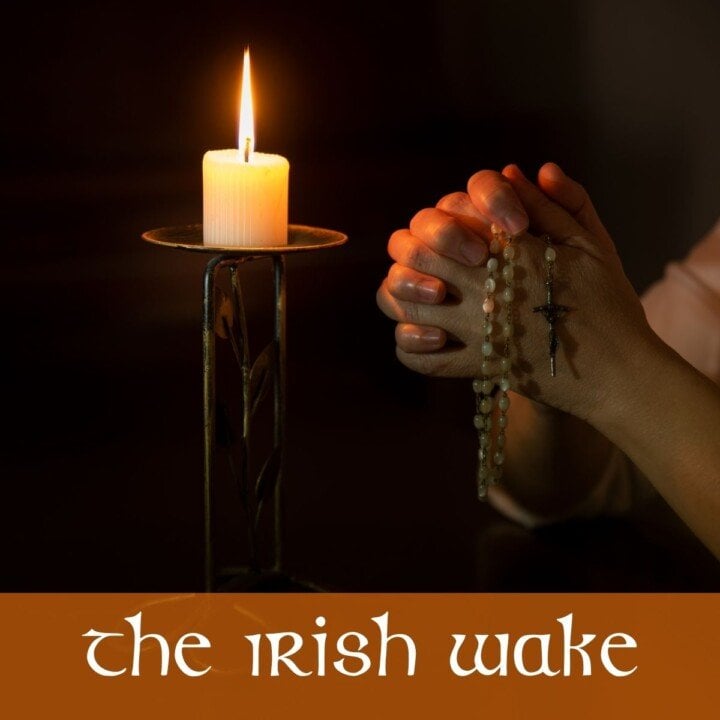
When the corpse was leaving the house, all doors in the house were opened to allow the spirit freedom to leave.
In some parts of Ireland, when a corpse was leaving a house, all the chairs and stools were turned upside down. If this was not done, it was believed that another funeral would shortly leave the same house.
It was the custom when the corpse was leaving the townland or the neighborhood where he or she lived, the coffin was laid down for a moment, so that the deceased was given a chance to say "goodbye" to his home and townland.
It was also important for a widow or widower to remember which door was used to remove a body. If he or she was to remarry, a new spouse was not to enter the home by the same door.
The Irish Goodbye - An Irish American Phenomenon
Now recently I learned of an American term called 'an Irish goodbye' which is associated with short farewells. In fact, an Irish goodbye in America, is also called ghosting, and refers to leaving a social gathering without saying your farewells.
Other names for such a silent departure include a French exit, French leave, Dutch leave or Swedish exit. The Germans refer to taking a Polish exit.
I never heard of the expression referring to an Irish exit in Ireland. And to tell you the truth, I was quite surprised to learn that my fellow countrymen in America are renowned for not saying a proper goodbye when leaving a host's home.
The Irish are renowned for their welcomes. In fact an Irish welcome is warm and friendly, so how can the exact opposite be true when it comes to saying farewell.
This got me wondering how all the goodbye rituals of my homeland did not travel across the Atlantic to America.
Perhaps the phrase is a reference to the time of the potato famine when Irish refugees left Ireland abruptly.
My theory is that new Irish arrivals were not sure of how to conduct a proper goodbye, American style.
Perhaps, they were afraid if they started any of the old Irish traditions and superstitions they would be ridiculed. Remember, when the Irish first arrived in America, they were not accepted, and many tried to live as quiet a life as possible, without drawing attention to themselves. They hid behind their windows and doors and became known as the "lace curtain Irish."
But the term "Irish goodbye" is loaded with negative connotations. Are the Irish being accused of getting so intoxicated that they forget to say goodbye. Perhaps the term is very straight forward cultuaral slander, adding to the age old stereotype of the drunken Irish.
The Irish cultural website Irish Central has proposed another theory about the origins of this phrase. They propose that an enraged woman coined the phrase when her "second Irish boyfriend in a row disappeared without a trace at the end of a date.” Are the Irish, in fact, the inventors of ghosting. Perhaps the phrase is no insult after all.
The Irish goodbye may have evolved in the United States, as those in the know slipped out the back door, to avoid the infamously prolonged real Irish goodbye, which would only have drawn unwanted attention.
Conclusion
Shakespeare may have summed it all up when he said "parting is such sweet sorrow," but in Ireland parting is full of superstition, and endless chat.
If you know of any other Irish superstitions regarding the rituals of coming and going, please feel free to tell us in the comment section below.
And so, without any more fuss, I bid you all farewell.

Slán agus beannacht,
(Goodbye and blessings)
Mairéad -Irish American Mom
Pronunciation - slawn ah-gus ban-ock-th
Mairéad - rhymes with parade
Other recipes and ramblings you might enjoy .....

Irish Wisdom And Sayings About Horses
Famine Memorial At Ireland Park, Toronto



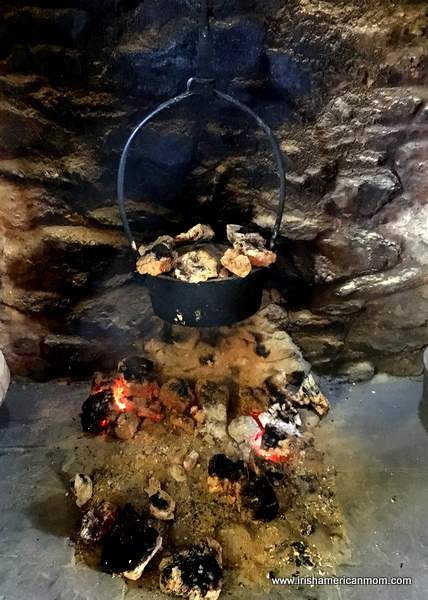




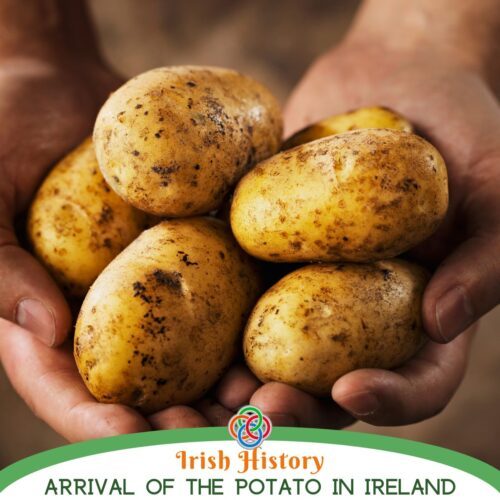
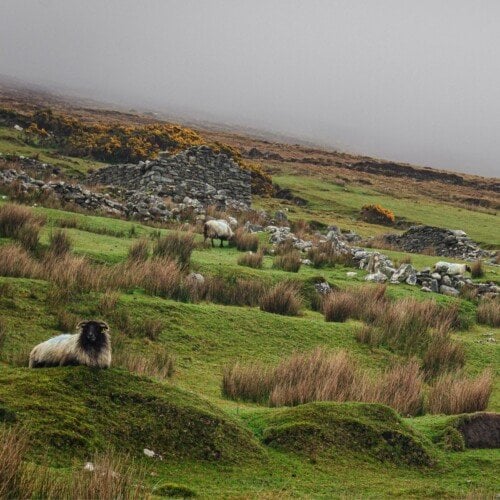






Patricia
I have to laugh Mairead, we do the same thing here. There is almost as much conversation at the door to say good bye as there was the entire visit! We walk our guests to the door, go out on the front steps with them in the cold, and wave to them as they drive off, some of them acknowledging us with a beep of their horn. I suppose we just hate to see a good thing come to an end, especially a lovely evening with family or friends.
Irish American Mom
Patricia - It's an Irish thing. These prolonged goodbyes are part and parcel of who we are. I'm glad to hear I'm not the only one who makes a big deal of saying goodbye. My kids have even climbed into the back of my husband's truck to wave goodbye to guests. I wonder if they will continue this tradition in years to come.
All the best,
Mairéad
Patricia
I think they will!
Irish American Mom
I sure hope they do!
Pat Egan Fordyce
I loved your remark, " I know my neighbors think I'm crazy, but what can I say I'm Irish!" I didn't realize I was carrying on tradition, we always walk friends to the door when they are leaving for hugs and goodby. Must be the Murphy part of my upbringing. I so love your blog.......
Irish American Mom
Pat - Walking guests to the door is definitely an Irish thing. I'm so glad to know you too carry on this tradition. With a name like Murphy in your heritage, these Irish ways are sure to survive.
All the best,
Mairéad
Elizabeth Ann
Oh my goodness!! I do that thing where I stand out and see anyone and everyone off at the outside of my front door until they drive off. I actually HATE it when I leave a friend's home and they shut the door behind me.......it feels so cold and unfeeling!! I am VERY Irish!! Indeed!
Irish American Mom
Elizabeth Ann - You most definitely are very Irish when you look forward to a really meaningful farewell. We send our blessings with our guests as they go on their way.
Best wishes,
Mairéad
Donna V
I love this topic! I still do this, it was just how my parents taught me. My dad who is 88 years old still continues with the long goodbyes. We're Murphys with a long list of Irish ancestry. Love your blog!
Irish American Mom
Donna - Thanks so much for your kind words about my blog. These old ways were brought to America by our ancestors and it's lovely to hear they continue to this very day.
All the best,
Mairéad
brian@irelandfavorites
Then there is the quick cup of tea, Mairead.
I'm just finishing the shoveling, nice light powdery stuff, not bad at all. I'll take two feet of powdery stuff to 10 inches of the snowman making variety. That heavy stuff is the most fun to play with but the nastiest to shovel,
Cheers,
Brian.
Irish American Mom
Brian - The quick cup of tea or the cuppa tea in the hand is a topic for a whole book. I'm glad to hear you didn't get inundated with mountains of wet soggy snow. Don't like shoveling that stuff at all. When I lived in Elmira there was snow on the ground for 4 straight months. I shoveled plenty of it.
Best wishes and stay warm,
Mairead
Cheryl Barker
Love these bidding farewell rituals, Mairead. Goodbyes at our house can be kind of long, too. And I like to stand and wave loved ones goodbye as they drive away. I guess my Irish roots are at work after all! 🙂
Irish American Mom
Cheryl - Waving goodbye is such a lovely warm thing to do. Sends our blessings home with our guests, I believe.
All the best,
Mairead
Penny Wolf
"In Ireland farewells can go on and on. Deep conversations are launched at the door. A quick exit is very difficult, so plan your departure with plenty of time to spare." That describes us to a "T". So much so that it
is applied to the telephone for my long distance Aunt! It is extra fun to know our ways aren't only because we are gabby. It's amazing how much you explain to us about ourselves, thank you as always.
Irish American Mom
Penny - I'm so glad you enjoy my ramblings about our Irish quirks and traits. Thanks so much for checking out my posts, and for joining our conversation on all things Irish and Irish American. I learn so much for readers.
Best wishes,
Mairéad
Denise E Mack
What is it called when an Irishman leaves the house at night to go visit his neighbors for the evening?
Denise Mack
Irish American Mom
Hi Denise - I believe the word you may be looking for is "ag bothántaíocht" which is used to mean visiting at night. It is pronounced as egg buh-hawn-tee-ucth. A bothán is a small dwelling or hut, so this verb means going to a hut. I hope this helps.
All the best,
Mairéad
Nanna
I'm Portuguese Brazilian (with a Celtic background), and I feel we have the same issue about farewell: no waving and leaving, it keeps going on and on and on around the door. My family's old Portuguese traditions sometimes look so... Irish 🙂
Irish American Mom
Nanna - It's nice to hear that old Portuguese traditions are similar to some of our old Irish ways. Thanks so much for checking out this little piece about how we say goodbye in Ireland.
All the best,
Mairéad
Jean | DelightfulRepast.com
Mairead, I loved this post! My dad was one of those slip-out-the-back-door kind of guys! He didn't like a lot of fuss about his arrival or departure or, come to think of it, his presence. And visitors to his home would be surprised when at some point in the evening he simply disappeared. When he was ready to go to bed, he would just slip away.
Irish American Mom
Hi Jean - Thanks for this lovely little story about your Dad. Many, like him do not appreciate a fuss around their comings and goings. An Irish farewell might not have suited him at all.
All the best,
Mairéad
Sarah
Hello! I'm so thankful I ran across your blog! A number of my ancestral lines were Irish but we've been here for at least 150-175 years or more. I was absolutely amazed to find a number of things you've mentioned in your blog as Irish tradition that I was raised with...including this one of the entire family escorting guests to the door and standing on the porch waving until they've driven away. I asked my late grandmother many times as a child why we did that and she always just said "it's rude not to". I'm not certain she knew why, we just did it. After reading through your blog and noticing similarities in other "southern" customs, I now wonder if these are traditions of our Irish ancestors that have held through the years.
Thanks for sharing your wisdom and culture with us.
Irish American Mom
Hi Sarah - The links between southern and Irish culture run deep. There are little nuances in our way of doing things, like saying a simple good-bye, that have roots in our Celtic ancestors rituals and customs. As I write these little pieces about my Irish American journey, I learn so much from readers like you, who join in these discussions, and reinforce my theories about cultural links between Ireland and America. Hopefully over the next few months we can delve a little deeper into these simple rituals we share.
Best wishes, and thanks so much for checking out my ramblings.
Mairéad
Philip Marley
Good story, but I had always heard it called, a "French Leave", so I looked that up. The Oxford English Dictionary records: "the custom (in the 18th century prevalent in France and sometimes imitated in England) of going away from a reception, etc. without taking leave of the host or hostess. Hence, jocularly, to take French leave is to go away, or do anything, without permission or notice." French, British or Irish, it's still kind of rude to leave anyone's home without a proper goodbye, in my book.
Irish American Mom
Hi Philip - Thanks so much for adding to this little discussion. I'm relieved to learn the original term for leaving without bidding adieu is to take "French leave." The American term an "Irish goodbye" makes no sense to me, since we are notorious for our long goodbyes. But, as you point out, no matter to whom we attribute these abrupt goodbyes, it's still a very, very rude thing to do.
All the best, and thanks for stopping by.
Mairéad
Colleen Kerry Warshawer (Mitchell)
Hi,
I always enjoy your blog about Ireland and Irish ways! I am American with recent immigrant relatives from County Tyrone. My kids and I (6 of them, yes we are Catholic!) speak to each other like your family, mostly English but lots of Spanish mixed in. I am fluent in both (I am not Hispanic) and so are s few of my kids, in that we live in New Mexico and they are exposed constantly in the school system. Anyway, it has occurred to me that, being of Irish descent, we should be doing the same with Irish too. I found a program called Duolingo and as I learn Irish I mix it in with our conversations. My kids love to say "comhairdes" (I may have spelled that wrong) and "Slan". They go to school and try to mix Irish words into their conversations just to see if anyone notices!
Irish American Mom
Hi Colleen - thank you so much for reading my blog and checking out my ramblings about Ireland. New Mexico is a beautiful state - so wonderful that you are bilingual. I always wish I had learned Spanish in school rather than French or German. Speaking Spanish would have served me well when I worked as a physical therapist. And I'm thrilled to hear you are sharing your Irish heritage with your children by teaching them Irish. It is such an expressive language, with wonderful gutteral sounds. Keep up the good work sharing your love of language and your Irishness with your kids.
Best wishes, and thanks for stopping by.
Mairéad
Mary Beth Boldt
Hi,
I always have done the Irish Goodbye at my front door (or gate for outdoor events/visits), and here in western New York State an Irish Goodbye, especially at a pub or festival can take quite a bit of time and ends with many wishes of "safe home" sometimes in Irish. We never seem to part easily or quickly.
Personally I attribute this to what I call genetic memory since my Irish Grandmother never passed on any traditions and I had no clue of anything Irish until I was in college and then it was music, drinking and the troubles. Many times since then I have "HAD" to do things like put a candle in the front window at Christmas and later found out these are old Irish traditions.
Now I always investigate any urges I get to do something to see if it's traditional. Your blog really helps with that. Thank you.
Irish American Mom
Hi Mary Beth - I love the term "genetic memory." Many us are drawn to music, customs, and traditions that are engrained in our DNA, whether we realize it or not. It's so interesting to learn how you were drawn to old Irish traditions without even knowing of their Irish origins - fascinating. Thanks so much for joining in our discussion about the long Irish goodbye. It takes us forever to end a phone call, since we always have to repeat a litany of farewells and goodbyes. Welcome to this little corner of the internet, and I hope you'll enjoy more Irish customs and traditions as I continue sharing my recipes and ramblings in the coming weeks, months and years.
All the best,
Mairéad
Kelly Madden
My dad's family is part Irish and they always end up chatting for a long time when people are leaving, whereas my mom's family is very swift, "Bye!" and out the door. Nobody walks you to the door unless a lot of people are leaving at the same time, in which case we might all gather in the foyer to say goodbye. But if it starts to take any length of time due to people chatting, my mom will say, "Quit with the long Irish goodbyes!", which was in reference to my dad's family. Last year, I read that an "Irish goodbye" is sneaking out and was so surprised based on the way my mom has always used it!
I definitely have a tendency to draw out a goodbye if I'm with good friends and I also tend to stand at the door and wait for someone to leave because I get a nagging feeling if I walk away before they've driven off and are out of sight, especially if my husband or mom is leaving with my kids. Although I may have picked that up from my Sicilian grandmother who always stayed at the door and waved to us until we were out of sight 🙂
Irish American Mom
Hi Kelly - It's nice to hear that you too don't associate the term "Irish goodbye" with sneaking away. Growing up in Ireland, saying goodbye always took so long. Full conversations started at the door. I was so surprised to learn the Irish American interpretation of an Irish goodbye. Thanks so much for sharing your family's story. It's lovely to hear from readers who have experienced the cultural nuances I love to share here on my blog. Thanks also for following my recipes and ramblings. I really appreciate it.
Best wishes,
Mairéad
Kate
Father's side was where my Irish comes from. Not sure but when we went to visit, iften thot it'd be better just to plan spending the night, which would've been great at my cousins but they weren't always kin. When I became an adult, my preferred habit was to 'ghost'. Say thank you, express appreciation & depart.
Seán
I too have heard of Irish Exit and really don't know what people are talking about. I do have other Irish Americans refer to a French Exit which you maybe at a pub and one has too much and leaves for jacks never to come back. However, at home, we have always gone to porch to see people off and only go back in after car is out of sight. Also, saying goodbye takes 30 minutes to an hour often. Many sidestories are told during goodbye. I do seem to be last one out and get in car last as other family members are waiting to leave. Another thing I do which I got from my grandmother was calling in on friends and family without notice. This just seems natural to me and if anyone was to show up at my house - there would be tea or coffee and a good chat. It is normal to me and my family.
Irish American Mom
Hi Seán - Thanks for sharing your experiences with the Irish goodbye, and it sounds like your family has spent many hours saying goodbye and gathering those last minute stories that are so important. That's exactly how my family has said goodbye over the years. Thanks for stopping by and joining in our conversation about all things Irish.
All the best, and happy New Year.
Mairéad
Rebecca Wright
Scots-Irish "senior citizen" here in VA. Those long goodbyes are the lonly thing I've ever known!
Irish American Mom
Hi Rebecca - Lovely to hear you too have experience the real Irish goodbye, which is heartfelt and truly meaningful.
All the best,
Mairéad